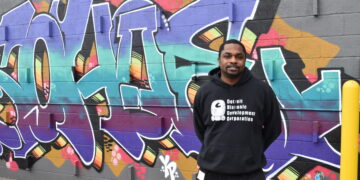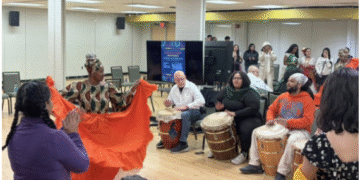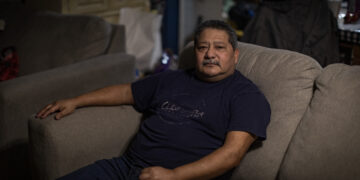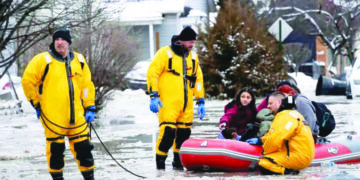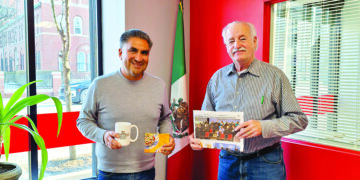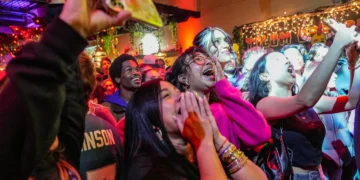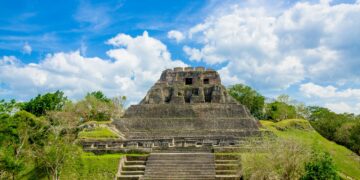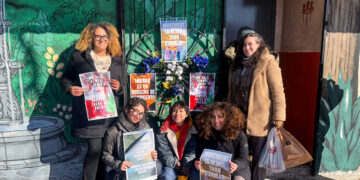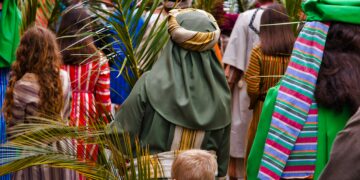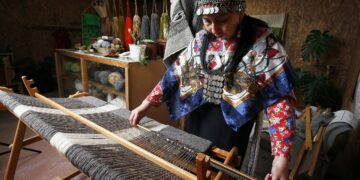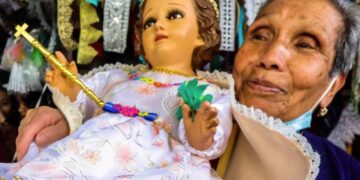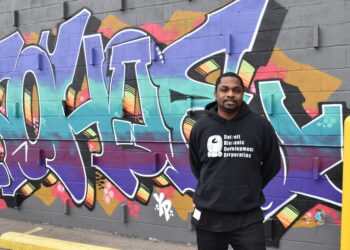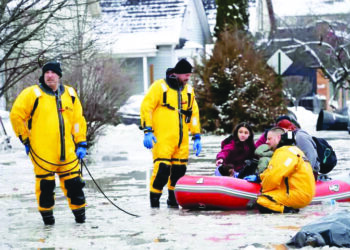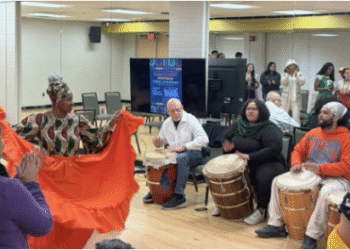By Elena Dolores Solano
Death is never easy, but an Ofrenda and El Dia de Los Muertos, also known as The Day of the Dead, reminds us that death is not the end.
El Día de Los Muertos is a day to remember and honor those who have gone before us. An Ofrenda, also called an offering or altar, is a concrete, tangible way in which we remember their laughter and stories. It is a poignant way to tell their story through the foods they loved, the music they listened to and the passion they had for living.
It is believed that El Día de Los Muertos and Ofrendas began approximately 3,000 years ago with the Aztec people of central Mexico. Its origins were based on the observance of Miccailhuitl–a ritual of honoring and connecting with the dead. That ritual combined with Catholicism evolved into a way of celebrating and honoring those who have gone before us.
Joseph Zarazua, a longtime community member and president of the parish council at Ste. Anne de Detroit recently told me that by building an Ofrenda, we mourn, but we also celebrate. Each year, Mr. Zarazua and I build an Ofrenda in the Basílica of Ste. Anne de Detroit.
This year, Mr. Zarazua also built one in the chapel; it is dedicated to his family and friends. He believes that “if you ever have trouble lamenting the loss of a loved one, there is nothing better that releases you of that pain than building an Ofrenda. Each item on the Ofrenda is so important because it becomes part of the joy of every memory you have of that person.”
Mr. Zarazua put a cup of coffee and a spoon on his Ofrenda because it reminds him of the mischievous side of his father. He told me that his father would clink the spoon to annoy his mother as a joke. “To me, an Ofrenda is cathartic.”
Mr. Zarazua reminded me that when we build Ofrendas together, we learn each other’s stories. We learn community stories. Each year Mr. Zarazua and I dedicate the main Ofrenda to an event that happened in our country or in the world. This year’s Ofrenda is dedicated to the children, young adults and men and women in Uvalde, Texas, Oxford, Michigan and Buffalo, New York – lives that were taken in mass shootings. There are sixty butterflies attached to two trellises that adorn the Ofrenda. The butterflies serve as a reminder of new life and the possibility of change.
He pointed out “Every time we build one, we think of something to dedicate it to, it’s big, but then people come to the Ofrenda with their pictures and objects, and we see the suffering they were dealing with, but we also see the joy they had in their lives.”
Laura Barroso-Olmeda exemplified that joy while living in pain. Ms. Barroso-Olmeda’s door on 23rd street was always open. She had many health problems and recently passed away. But it is her sense of humor, her love for others, her passion for baile folklorico, and her stories for which she is remembered. She was a proud graduate of Cass-Technical High School and Wayne State University. In my many visits with her, we talked about her health, and our families.
But most of all, we laughed. She was also active in many community agencies throughout Detroit.
Several years ago, I visited the Ofrendas at Garaje Cultural. The Ofrendas were large and stark; each one had a theme and was decorated with intricate details of a loved one’s life. One Ofrenda was white with flowers hanging from the ceiling, soft pink highlighted a chair, and a dresser held precious objects. The memory of it has stayed with me for years.
Irma Landin-Obregon, the former principal of Maybury Elementary School shared that many years ago Casa de Unidad invited her to create an Ofrenda in memory of her sister Margarita Valdez, a community activist, social worker and educator. She felt overwhelmed when her sister passed away. Ms. Landin-Obregon continued: “I sorted through all her things trying to find the things that represented her and what she meant to our family and community. Creating the Ofrenda really helped me to get to know my sis ever better. But, it also helped me to realize that for an Ofrenda to be meaningful, you have to share the things that represent the person you are remembering by talking about them to others. That is how you keep their spirit alive.”
Southwest Detroit is known for many things; food, culture, churches and the unique makeup of schools, parks and a multicultural population. We also have a community that embraces El Dia de Los Muertos and Ofrendas. The tradition runs deep in our roots and every year there are numerous celebrations.
There are numerous ofrendas to visit and ponder and there are events happening throughout Southwest Detroit to celebrate El Dia de Los Muertos. Be sure and visit the ofrendas at Prince Valley Supermarket and the local restaurants. There is also a fun run on November 5th sponsored by the Southwest Detroit Business Association.
My mother, Rosa Solano, taught me to die well. When I leave this earth, I hope it is with the same quiet grace and dignity that encompassed her death. She lived a full but hard life. As a child, she worked as a migrant worker, shelled pecans and did other people’s laundry.
But she also loved bright colors, flowers and books. She was an avid gardener. Each fall, as summer came to a close, she carefully collected seeds from her plants and replanted them in the spring. In the middle of the chaos of fourteen children, a workaholic husband, and the industry that closed in all around us, she created a haven.
My mother died en la madrugada–at dawn. The chair she died in faced our parish, Ste. Anne’s. She continued to make her choices even after death. She chose the dress she wanted to be buried in. She chose the music she wanted for her funeral mass. She chose her casket and the resting spot for her body at a plot next to my father.
She died well and showed me that dying is a process. It is not a solitary act. It is a plan, a call, and a final place. But it is not the end. It should be done with thought, prayer, dignity, and deliberate intention. She was far from afraid of death. She walked towards the great beyond. She was taken by a constant challenge to grow and change, to forgive and love, to learn and become more of who you are supposed to be–in this life and the life to come.
El Día de Los Muertos is a celebration of those who we miss, love and admire. While we mourn, we also celebrate, and remember the friends and family that we continue to love. We honor them with an Ofrenda, intentionally creating a space where we can laugh and cry at all that was, and all we have because of their love.


